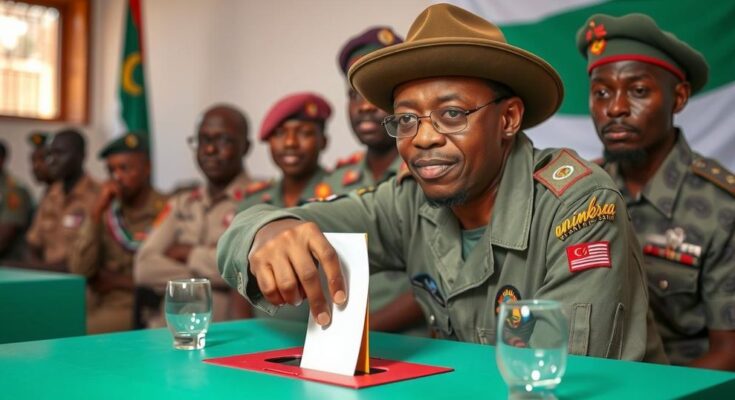Chad held parliamentary elections on Sunday after three years of military rule, but turnout was low due to a boycott by major opposition parties. This election, marking the first parliamentary voting in over a decade, follows a disputed presidential election under junta leader Mahamat Idriss Deby, who ascended to power in 2021. Analysts express concerns about Chad’s democratic future amid ongoing political unrest and security challenges.
On Sunday, voters in Chad participated in parliamentary and regional elections that marked the conclusion of a three-year transitional period of military rule; however, voter turnout was notably low. The opposition, comprising over ten parties including the prominent Transformers party, chose to boycott the vote, claiming the electoral process lacked credibility. This election is significant, as it is Chad’s first parliamentary election in over a decade, following a disputed presidential election headed by junta leader Mahamat Idriss Deby, who took control in 2021 after the death of his father, long-serving president Idriss Deby Itno.
Despite the significance of the election, many polling stations in the capital, N’Djamena, displayed few voters throughout the day. There are approximately 8 million registered voters tasked with electing 188 legislators of the new National Assembly and representatives at local government levels. Analysts indicate that the election is particularly crucial for the future of democracy in Chad, which has not experienced free elections since gaining independence from France in 1960, and highlights ongoing struggles against militant threats and a shifting relationship with France, a historical ally.
Prominent opposition figure, Succes Masra, criticized the legitimacy of the electoral process, previously serving as prime minister earlier in the year. He claimed that the election was only a guise for Deby to consolidate power further, asserting that results would potentially be manipulated. Many voters expressed their hopes for a better future for Chad, yet the opposition’s withdrawal casts uncertainty over the electoral outcomes and the overall democratic transition, leading political analysts to voice concerns about the sustainability of democracy in Chad in the face of military influence.
The parliamentary elections in Chad are pivotal, as they signify a potential transition from military to civilian governance, even though they are marred by opposition boycotts and low participation. Mahamat Idriss Deby, who assumed control of the country after his father’s death, has faced significant criticism for not ensuring a transparent electoral process. As Chad remains one of the poorest nations in Africa, the move toward democracy has been long awaited but is complicated by ongoing security issues and strained international relations, especially with France.
The recent parliamentary election in Chad marks a critical juncture in the nation’s political landscape, symbolizing a shift from military rule back to democratic governance. However, the significant opposition boycott and low voter turnout raise serious concerns regarding the legitimacy and future of Chad’s democracy. The outcome of this election may have considerable implications for political stability and governance in Chad as it confronts multiple internal and external challenges.
Original Source: apnews.com




